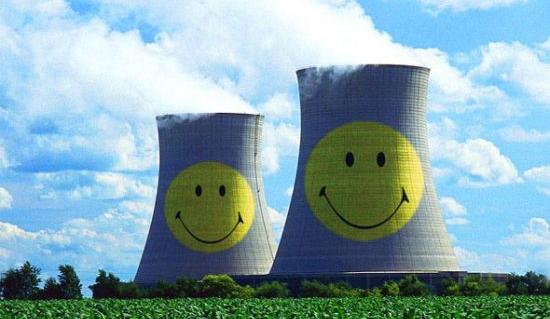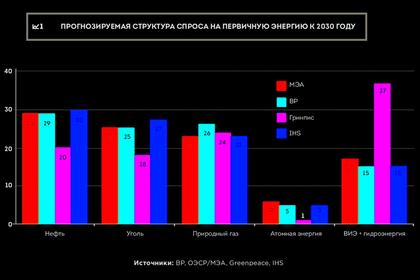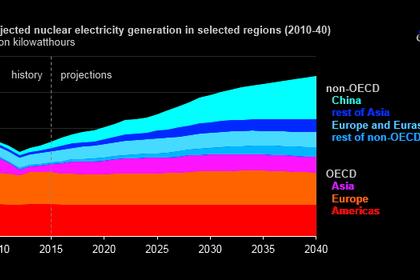МИРОВЫЕ АТОМНЫЕ ТЕХНОЛОГИИ

РОСАТОМ - 2 октября 2019 года в Москве, в ЦВЗ «Манеж» в рамках Российской энергетической недели (РЭН) прошла пленарная сессия Госкорпорации «Росатом», названная «Атомная энергетика как неотъемлемый элемент повестки устойчивого развития».
Участники панельной дискуссии представляли различные сферы деятельности: бизнес, государство, международные организации. В пленарной сессии приняли участие заместитель генерального директора, руководитель Департамента ядерной энергии МАГАТЭ Михаил Чудаков; министр иностранных дел и торговли Венгрии Петер Сийярто; генеральный директор Корпорации по атомной энергии ОАЭ Мохамед Аль-Хаммади; министр энергетики Республики Беларусь Виктор Каранкевич; председатель Совета директоров Управления по АЭС Египта Амгед Эль-Вакиль; генеральный директор Framatome Бернар Фонтана; генеральный директор Госкорпорации «Росатом» Алексей Лихачёв. Модератором сессии выступил президент Научного совета глобальных инициатив Том Блис.
Участники обсудили ключевые эффекты и ценности атомных технологий, их влияние на качество жизни людей, основные барьеры, стоящие на пути развития современной атомной энергетики, а также то, какую роль играют атомные технологии в достижении целей устойчивого развития.
В начале дискуссии Том Блис упомянул недавний доклад Международной энергетической ассоциации, который отмечает, что атомная энергетика в настоящее время является вторым по величине низкоуглеродным источником энергии в мире – на долю АЭС приходится 10% от мирового производства электроэнергии.
По мнению генерального директора Госкорпорации «Росатом» Алексея Лихачёва, для того, чтобы формировать энергетическую повестку будущего, современные энергетические системы должны стать более гибкими и клиентоцентричными, чтобы отвечать запросам потребителя. «Мировая атомная отрасль сегодня становится фабрикой новых технологий. Это и IT-технологии, и суперкомпьютеры, и новые материалы. Это ядерная медицина, новые типы электрогенерации, в том числе – ветроэнергетика. Мы не только видим современную повестку и участвуем в ней, мы формируем эту повестку. А новые технологии – это то, что делает жизнь людей лучше, комфортнее и безопаснее», – заявил А. Лихачёв.
«Строительство Белорусской АЭС ведётся в тесном взаимодействии с Росатомом, который является лидером по сооружению атомных станций за рубежом. Первый блок уже в высокой стадии готовности, на втором блоке продолжается монтаж оборудования. Ввод АЭС позволит обеспечить порядка трети энергопотребления и окажет положительное влияние в части сокращения выбросов и уменьшения парниковых эффектов», – отметил в своём выступлении министр энергетики Республики Беларусь Виктор Каранкевич.
«Строительство АЭС в Венгрии рассматривается нами не просто как стройка, но как общая концепция дальнейшего продвижения экономики страны на более высокий уровень - это, например, высококвалифицированные специалисты, что в целом повышает уровень национальной экономики, это около 1000 новых рабочих мест, это развитие инфраструктуры. Я считаю, что решение о строительстве АЭС «Пакш» - это одно из лучших экономических решений за последние годы», - подчеркнул министр иностранных дел и торговли Венгрии Петер Сийярто.
Многие участники дискуссии высказали мнение, что без атомной энергетики нереализуема глобальная климатическая повестка, так как атомная генерация является низкоуглеродной и обеспечивает минимизацию выбросов CO2 в атмосферу. Было отмечено, что атомные станции, являясь инфраструктурными проектами национального масштаба, несут значительные эффекты развития и для промышленного сектора, и для местного населения.
Для справки:
Российская энергетическая неделя – международный форум по энергосбережению и развитию энергетики. Проводится Министерством энергетики РФ и Правительством Москвы. Оператором Форума выступает Фонд «Росконгресс».
-----
THE GLOBAL NUCLEAR TECHNOLOGIES

WNN - 04 October 2019 - Delegates at a plenary session of Russian Energy Week taking place this week in Moscow discussed how nuclear power is an "inalienable element of the sustainable development agenda". The session, which was hosted by Russian state nuclear corporation Rosatom, included panellists from Belarus, Egypt, Hungary and the UAE, as well as from the International Atomic Energy Agency (IAEA).
They discussed the key effects and values of nuclear power technologies, their impact on the quality of life of people, the main barriers to their development, and their role in achieving the United Nations' Sustainable Development Goals (SGDs). Rosatom published a summary of the discussion on 2 October.
The session was moderated by Thomas Blees, president of the Science Council for Global Initiatives, who referred to International Energy Agency data that shows nuclear power is the second largest low-carbon source of electricity in the world, with nuclear power plants accounting for 10% of global electricity production.
Alexey Likhachov, Rosatom director general, said that energy systems must become more flexible and client-centric to meet consumer needs.
"The global nuclear industry today is becoming a factory of new technologies. These are IT-technology, supercomputers and new materials. These are nuclear medicine and new types of power generation, including wind energy. We not only see the modern agenda and participate in it, we form this agenda. And new technologies are what makes people's lives better, more comfortable and safer," Likhachov said.
Viktor Karankevich, minister of energy in Belarus, said unit 1 of the country's first nuclear power plant, under construction in the Grodno Region, is "already in a high stage of readiness", and installation of equipment continues on the second unit.
"The commissioning of nuclear power plants will make it possible to meet about one-third of [our] energy demand and will have a positive impact in terms of reducing emissions and reducing greenhouse gas effects," the minister said.
Péter Szijjártó, Hungarian minister of foreign affairs and trade, said his country's project to expand the Paks nuclear power plant is "one of the best economic decisions [it's made] in recent years".
"We consider the construction of nuclear power plants in Hungary not just as a construction project, but as a general concept for boosting the country's economy to a higher level - for example, highly qualified specialists, about 1000 new jobs, infrastructure development," he said.
A global approach to tackling climate change is not feasible without nuclear energy, the panellists said, since nuclear power minimises the emission of CO2 into the atmosphere. In addition, nuclear power plants are national-scale infrastructure projects with significant developmental effects for both the industrial sector and the local population, they said.
The session also included Mohamed Al Hammadi, CEO of Emirates Nuclear Energy Corporation, Amged El Wakil, director of Egyptian Nuclear Plants Authority, Bernard Fontana, CEO of Framatome, and Mikhail Chudakov, International Atomic Energy Agency (IAEA) deputy director general and head of its Department of Nuclear Energy.
According to the IAEA, nuclear technologies - used for energy, human health, food production, water management and environmental protection - contribute directly to nine of the 17 SDGs set out in the United Nations 2030 Agenda for Sustainable Development.
Russian Energy Week is an annual event for discussion of the main developments and challenges faced by the gas, oil, coal, petrochemicals and electricity sectors.
-----
Earlier:

2019, September, 27, 13:40:00
НИЗКОУГЛЕРОДНАЯ ЭНЕРГЕТИКА РОССИИ
Представитель Минэнерго сообщила, что сегодня в топливно-энергетическом балансе России более 60% приходится на долю безуглеродных или низкоуглеродных источников энергии. В части электроэнергетического баланса 75% выработки электроэнергии уже осуществляется на источниках с низкой удельной эмиссией парниковых газов, в том числе на атомных и гидроэлектростанциях. «По сути, топливно-энергетический и электроэнергетические балансы нашей страны уже сегодня соответствуют логике низкоуглеродного будущего», - заключила Анастасия Бондаренко.

2019, September, 26, 13:25:00
CLEAN NUCLEAR POWER
Nuclear reactors are the unsung heroes as we set out to respond to the climate change challenge. The need for nuclear energy has never been greater - there simply is no other energy source which can deliver deep decarbonisation within the necessary timeframes.

2019, September, 24, 18:05:00
РОССИЯ ПРИНЯЛА ПАРИЖСКОЕ СОГЛАШЕНИЕ
Накануне Саммита премьер-министр Дмитрий Медведев сообщил о подписании постановления Правительства РФ «О принятии Парижского соглашения». Россия подписала Парижское соглашение в 2016 году и участвует в переговорном процессе в рамках Специальной Рабочей группы по Парижскому соглашению на площадке Рамочной конвенции ООН об изменении климата (РКИК ООН).
All Publications »
Tags:
NUCLEAR,
ROSATOM,
РОСАТОМ,
АТОМ










